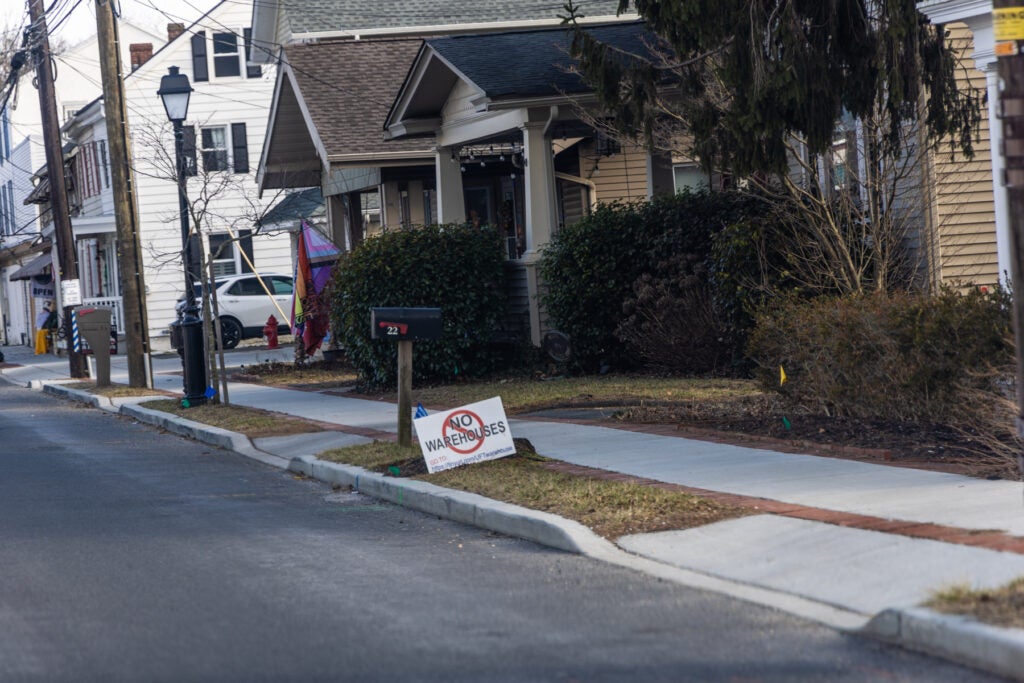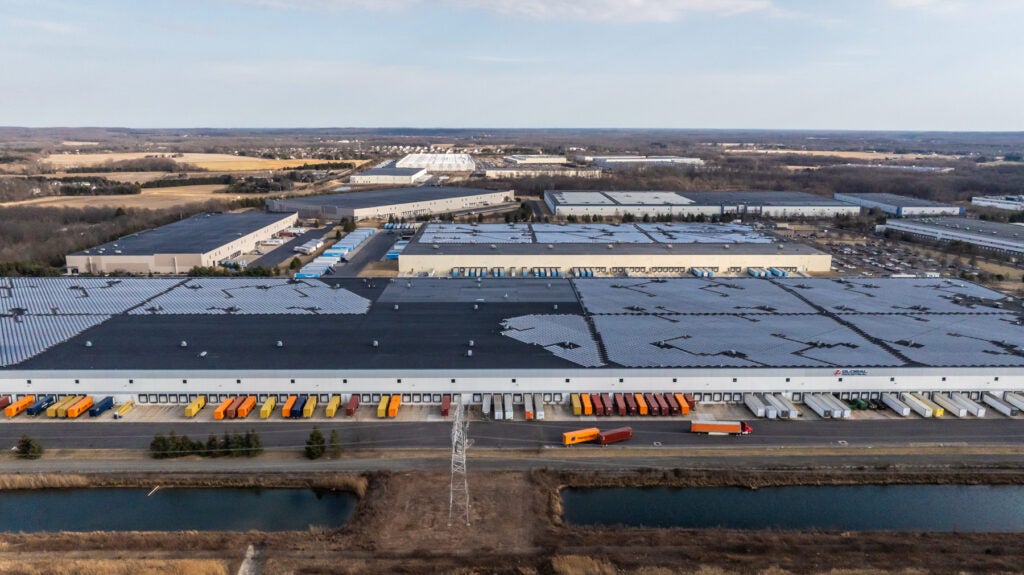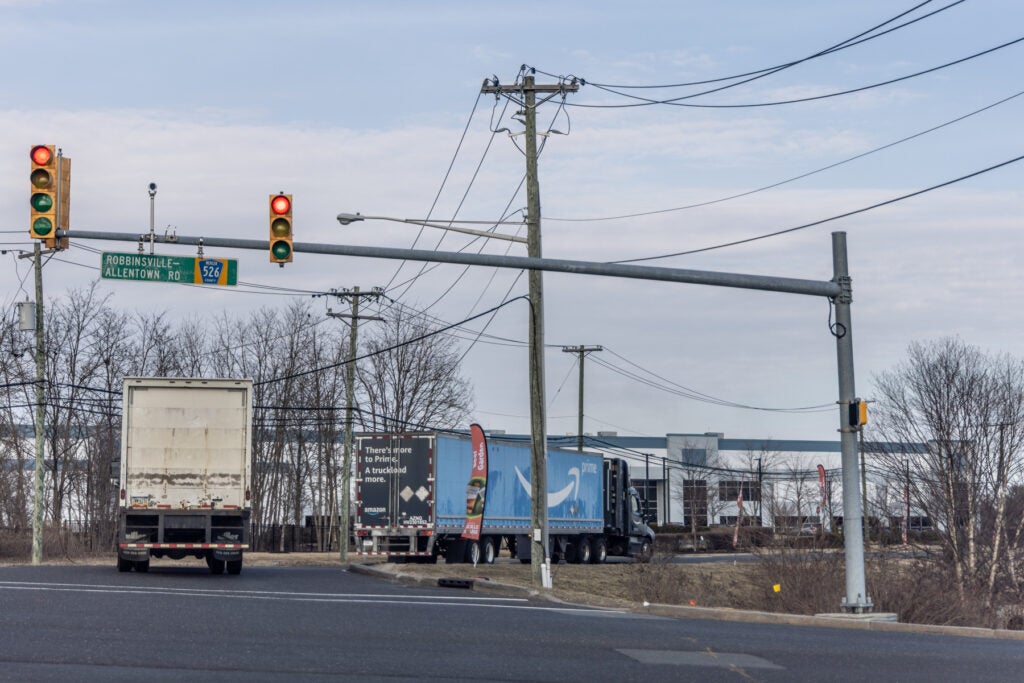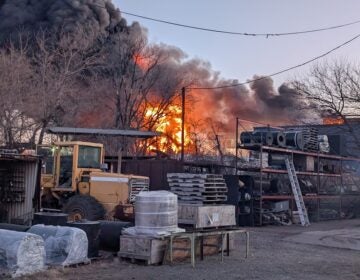New Jersey lawmaker wants to keep warehouses away from historical sites
A South Jersey lawmaker has introduced a bill to keep all warehouses in N.J. at least 1,000 feet away from historic districts, landmarks and buildings.
Listen 1:13
Distribution warehouses in Robinsville, N.J. (Kimberly Paynter/WHYY)
From Camden and Cherry Hill to Trenton and the Jersey Shore, what about life in New Jersey do you want WHYY News to cover? Let us know.
Warehouses have been a contentious issue for many New Jersey communities. Now, a South Jersey lawmaker wants to block their construction near historical sites.
Assemblywoman Carol Murphy, D-Burlington County, introduced a bill that would prevent towns and counties from approving warehouse construction within 1,000 feet of historic districts, properties, structures and objects. The proposal defines historic districts as properties, structures, areas and objects listed on the National Register of Historic Places or on the New Jersey Register of Historic Places or designated as a historic site or historic district by the State Historic Preservation Officer.
Jersey is home to around 200 recognized historic sites, and they must be shielded from the potential “detrimental effects” of development, Murphy said.
“When we start building warehouses in communities, we’re now forcing those trucks to go through somebody’s community, which ultimately decreases them wanting to go out, and [it is] disturbing the lifestyle that they’re used to,” she said. “The problem isn’t the warehouse, it’s where they encroach on our historic jewels of our neighborhoods, of our community, of our state.”

The bill is one of the latest efforts to stem the growing number of these large-scale storage facilities. Over the years, advocates, environmentalists and residents have raised alarms about health and quality-of-life impact on residents that live near these buildings.
Ray Cantor, deputy chief government affairs officer of the New Jersey Business and Industry Association, said it’s important to remember warehouses are essential for the state’s economy.
“We are a logistics state, we have the largest port on the Eastern Seaboard [the Port of New York and New Jersey] and that’s an economic driver for the entire state,” he said. “More and more people are buying their products online and they expect next-day service, and even same-day service, warehouses are that essential part of the logistics industry that makes it all happen.”
He said warehouses help facilitate employment and boost the state economy.
“You’re seeing thousands and thousands of jobs being created in the warehouse industry both from construction and their operation,” Cantor said.
Does New Jersey have too many warehouses?
According to an Environmental Defense Fund report, there are 3,034 warehouses in the Garden State comprising 527 million square feet. That number has grown 35% over the past two decades. The report says warehouses generate close to 400,000 daily truck trips, and about one-third of the state’s population, 2.7 million people, live within a half mile of one.
Stacey Fox, the executive director Mercer County Defense League, said there is definitely a place for warehouses in New Jersey, but that place isn’t next to neighborhoods and schools, where it can adversely impact the lives of residents.
“Imagine having a high school student just learning how to drive, and now they have to share the road with literally hundreds of tractor trailers. It’s just unfathomable,” she said. “They’re really poorly placed and they can endanger people, health and safety is a big question, diesel fumes, it’s been proven that they’re responsible for a whole host of cancers.”

Kathleen Karch and her husband, Carl, have lived in their Hamilton, New Jersey home for almost 42 years. The property next door used to be an 88-acre dairy farm, but two years ago a 122,000 square foot warehouse was built at the site.
Kathleen Karch was so traumatized that she went into therapy.
“I can’t look out my kitchen window anymore, I block it with a curtain, I can’t look at it,” she said. “We worked hard, we paid everything off, this is our senior years, and I feel violated.”
Karch said when the warehouse construction plans were unveiled, she was shocked, but local officials told her “well, you knew this could happen.”
The warehouse hasn’t opened yet, but Karch is worried the facility could be operational 24 hours a day.
“I wouldn’t live here if it was my choice, but my husband’s parents built the house,” she said. “He’s been here all his life, he doesn’t want to leave it, but I would walk out in a heartbeat.”
Fox said many communities that now have a warehouse have seen their quality of life change.
“You’re going to go from being able to go to sleep at night with your windows open to having to seal everything up, and maybe now your kid has to go to school with an inhaler. You know it’s really, really toxic,” she said. “We just see this really greedy pursuit, this hot pursuit of full speed ahead continuance of this development, when the need after COVID has waned.”
Fox said Hamilton Township has been hit hard.
“They have like nine vacant warehouses sitting, and they were just about to approve overturning zoning that protected a rural resource conservation zone and allowing it to become commercial so they could build a warehouse,” she said.
Pete Kasabach, executive director of New Jersey Future, a nonprofit organization that advocates for smart growth and sustainable development in the Garden State, said the Office of Planning Advocacy within the New Jersey State Planning Commission created guidelines for municipalities to determine where they should allow warehouses to be built, but many towns ignore the directives.
“The challenge is that the guidance is voluntary, and municipalities then need to take that guidance, and use it to change their local zoning and their local ordinances before a developer comes in with a proposal to do a warehouse,” he said.
Kasabach said that if a town has zoned an area for a warehouse, but residents raise objections, the municipality may find itself on shaky legal ground and even get sued by warehouse companies if they don’t approve the plan.
He pointed out that a town may have large warehouses that are vacant, but a company may decide to build a new one right down the road.
“Each developer is making a decision about why they’re choosing a site, the type of warehouse they want to build there, what their financing is in order to make that warehouse happen,” he said.

Kasabach said taking a legislative approach to help guide warehouse location decisions is an interesting idea.
“How can the state of New Jersey do a better job of regionally planning, and help give developers as well as municipalities better guardrails for where warehouses should go?” he said. “That would be a positive next step.”
Murphy’s bill was referred to the Commerce, Economic Development and Agriculture Committee.
She is convinced strict location guidance for warehouses makes sense.
“Deep South Jersey has plenty of property that warehouses can be housed down there, but if we try to squish them into our communities, we’re going to start making it harder for our communities to exist,” she said.

Get daily updates from WHYY News!
WHYY is your source for fact-based, in-depth journalism and information. As a nonprofit organization, we rely on financial support from readers like you. Please give today.







